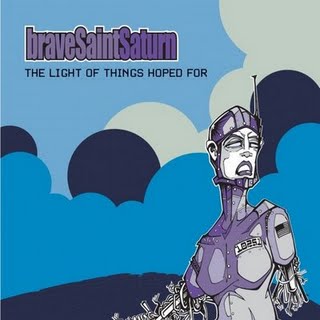 70. Gin Blossoms - Outside Looking In (1999)
70. Gin Blossoms - Outside Looking In (1999)
Gin Blossoms had a number of different hits throughout their career, including a #1 ("Found Out About You"), and two more top-ten hits ("Follow You Down" and "Til I Hear It From You") but to the world at large they're generally considered a one-hit wonder - though weirdly, not for any of their top-ten singles. Instead, the song that springs to everyone's mind is "Hey Jealousy," a song so ubiquitous that a full two years after its release, it still obstinately remained on the Billboard Top 100. In fact, the Gin Blossoms were the first band to usher in that signature 90's alternative-rock sound, writing songs so comfortable and familiar that they would never disappear from radio rotation, even to this day. It's a shame that their songwriter, the oft-soused and troubled guitarist Doug Hopkins, never got to see the waves his music created. He committed suicide in 1993, not long after he was fired from the band, who were so fed up with the music industry that they titled their major label debut New Miserable Experience, which was released to America at large with no fanfare and middling reviews. They had no idea they would end up being the forefathers of a new breed of folk-and-country-infused rock music, eventually giving way to Counting Crows, Toad the Wet Sprocket, the Cranberries, and of course Hootie and the Blowfish. The record ended up going multi-platinum, and by the time the third single ("Until I Fall Away") was released, critics had come around and hailed the record as "pure pop goodness."
I didn't discover the band until much later, when I purchased their best-of record, Outside Looking In, which collected both their hit singles and a number of much lesser-known and rarer tracks. It's spotty at times, but the record takes you back to a different time, when modern rock was an untapped commodity and good songwriting was finally coming back into vogue.
Download This: Until I Fall Away, Not Only Numb, Pieces Of The Night, As Long As It Matters
 69. Ryan Adams - Demolition (2002)
69. Ryan Adams - Demolition (2002)
This is not my favorite Ryan Adams record, as it's mostly filled with songs leftover from the recording sessions of his far superior works, Heartbreaker and Gold, but like any Adams record, it contains a few songs of such rough-hewn perfection that it's impossible not to be bowled over. Like "Desire," later featured in one of the top-ten "West Wing" episodes of all time (season 6's "King Corn"), and the king of all lost-love anthems, "Dear Chicago."
Download This: Dear Chicago, Desire, Hallelujah, You Will Always Be The Same
 68. Copeland - Beneath Medicine Tree (2003)
68. Copeland - Beneath Medicine Tree (2003)
I stumbled across this record in college, when it spread like wildfire across campus in the way that albums do in colleges these days (God bless you, MyTunes and loose firewall settings). Beneath Medicine Tree is a great album - the only one the band has ever managed to put together - but it still suffers from the same struggles all their records have: it's frustratingly inconsistent. Copeland knows what their strengths are - a band capable of crafting good, simple, pantingly desperate pop songs - but feel the need to try to punk up the record. The result is a vaguely cohesive mixed bag of songs, all of whom were written as simple acoustic melodies and then re-invented and re-layered, occasionally beyond recognition. When the album works, though, it really works, as with the sad, desperate opener ("Brightest"), or its more epic set pieces ("When Paula Sparks," "California"). Despite its shortcomings, the record plays through from beginning to end awfully well, though it's all too tempting to keep skipping back to the beginning of "California" to hear it over and over again.
Download This: California, When Paula Sparks, Brightest, When Finally Set Free
 67. Caedmon's Call - Long Line Of Leavers (2000)
67. Caedmon's Call - Long Line Of Leavers (2000)
We've crossed a line in this list, since I came to this entry and said "how can this be at #67? I love this record!" Then I scrolled up and realized I couldn't move it any higher than I already had it. We've moved out of records I that I merely enjoy and into records with which I have a real lasting emotional connection. As with this record, which has two songs in heavy contention for my favorite Christian song of all time. By far the most controversial record they ever produced, this album came at the height of Caedmon's popularity, and set off a firestorm of fan protest. How dare they ditch their acoustic jam-style and layer in electric guitars and punchy horn solos? Fortunately for fans, the record Caedmon's chose to reinvent themselves on was also one of the best records they ever produced, an album so solidly written it's near-impossible to skip a track (well, maybe the quavering "Piece Of Glass" gets jumped a time or two). Personally, I'm torn between Derek Webb's deeply personal songs of confession and lost love ("What You Want," "Love Is Different,") and Cliff Young and Ed Cash's alternately catchy pop and elegiac dirges ("Love Alone," "Only One"). But then, the great thing about this record is that you don't have to chose.
Download This: What You Want, Love Alone, Love Is Different, Can't Lose You
 66. Coldplay - Viva La Vida Or Death And All His Friends (2008)
66. Coldplay - Viva La Vida Or Death And All His Friends (2008)
This is the first of two Coldplay albums on this list, which is a little surprising, as I've always been a big Coldplay fan, but they just didn't make what proved to be a pretty tough cut here. What's more surprising is how quickly this album rose to prominence in their catalog for me. It's an album that's so strong that even though it was released at the height of Coldplay backlash, people still haven't been able to pick on the quality of the record since it's just such a beautiful recording. It's funny, but even though Coldplay is maybe the biggest band on the planet, Vida is really an underrated record. Working with superproducer Brian Eno, the band strips back all the pounding, semi-melodic piano and overworked lyrics that weakened X + Y and instead create more subtle orchestrations and a grander musical vision. While songs like "Viva La Vida" and "Lost!" have a clear pop radio sensibility, the album as a whole feels like a cohesive artistic statement. And a damn good one.
Download this: Lost!, Death and All His Friends, Viva La Vida, Life In Technicolor
 65. Brave Saint Saturn - The Light Of Things Hoped For (2003)
65. Brave Saint Saturn - The Light Of Things Hoped For (2003)
Here's where doing research for these sorts of lists comes in handy - I discovered while looking this album up that Brave Saint Saturn finally released another record! Originally intended to be a "space trilogy," the band semi-disbanded at around the same time they finished this record (the band being a side project of another band - Five Iron Frenzy - that was disbanding at this time, I imagine it seemed pointless to continue), and so it seemed unlikely that the band would ever finish their "astro-rock odyssey," a term band frontman Reese Roper eventually admitted "doesn't really mean anything." The record was the second in a series about space and the voyage of the atronauts of a mythical Saturn 5 expedition, though the record was mixed with songs of all varieties, including Roper's pointed indictment of his ex-fiancé's sudden betrayal ("Enamel") and his memorial to a dead friend whose faith he admired ("Estrella"). A moody and unforgettable record. I'll be purchasing the follow-up very soon.
Download This: The Sun Also Rises, Estrella, Enamel, Daylight
 64. Pete Yorn - Nightcrawler (2006)
64. Pete Yorn - Nightcrawler (2006)
Like The Light of Things Hoped For, this album is also part of a trilogy. And I'll just say it: not enough artists do trilogies. There's nothing like an artistic statement that says "I'm not just trying to sell records here, I'm trying to tell you story, and I will take six years to do it if I have to." Now, that's admirable. Yorn followed musicforthemorningafter with Day I Forgot, and then this record, through which we learned that it might not be all that fun to hang out with Pete Yorn for an extended period of time, but if we did we would certainly get an epic song out of our experience. I mean, in Day I Forgot, he writes a song about eating a burrito at a 7-11, for chrissakes. Nightcrawler perfectly fits Yorn's aesthetic, though, since Yorn's songs always seemed written the day after waking up from a particularly epically bad night, the theme of this record fits right in line with that mentality. Nightcrawler seems like a record composed at the exact second that you realize that the girl you came there with would not also be leaving with you. It's somehow at all times angry, depressed, vindictive, pleading, and deeply worshipful, which is not necessarily an easy thing to pull off. What's more, it's awfully consistently good.
Download This: The Man, Ice Age, Maybe I'm Right, Vampyre, For Us, Undercover
 63. Jack Johnson - In Between Dreams (2005)
63. Jack Johnson - In Between Dreams (2005)
Jack Johnson isn't just good at what he does, he's effortless at it. He sounds like he lives in a completely different world than I do, and maybe he does. Imagine a world where you wake up on the beach to a perfect day, every day. You wander up and down the shore, the sun gently winking off the water. Your friends come over and you go out surfing, then you kick back in the shade and let the day wash over you, someone quietly strumming a guitar and humming a tune. Sometimes the mood overtakes you and you all join together in a chorus, but most of the time you lay back in the hammock, the sun flickering through the leaves, and just let the music play. The sun goes down, and you wander out by the water with your girl, the moonlight playing off her tanned skin as the stars come out. You fall asleep again on the beach, gazing up at the sky. Now, that's exactly what this album is like.
Download This: Better Together, Do You Remember, Sitting, Waiting, Wishing
 62. Black Lab - See The Sun (2005)
62. Black Lab - See The Sun (2005)
To give you an idea of how long I waited for this record: one of the first CDs I ever purchased was Black Lab's Your Body Above Me, which came out in 1997. I had to wait 8 years for a follow-up record, which is an awfully long time for any music fan, and a touch soul-crushing for someone who's fourteen and has just discovered popular music to learn the hard way that it's never good to hear that your favorite new band is having "trouble with their label" (there's not a music fan in the world who doesn't flinch when they hear those words). Incredibly, the record ended up being worth the wait: not nearly as bleak as their first record, See The Sun was simply packed with well-crafted pop rock songs and heart-on-your-sleeve songwriting. Singer Paul Durham pours a honeyed Brit-whine vocal on top of songs of such desperation it's tough not to be drawn in. It's a rare band who entrances you as much at 22 as they do at 14 (take that, Brian Setzer Orchestra!).
Download This: Lonely Boy, Dream In Color, Circus Lights, See The Sun
 61. Collective Soul - Dosage (1999)
61. Collective Soul - Dosage (1999)
I've now reached a point where seeing this CD only makes me think of an argument I once had with a friend, who told me he'd been a fan of Collective Soul since "right as they started getting big," which apparently was during this record. The fact that the band had already gone over six times platinum on their previous three records had somehow eluded him. I could not dissuade him of this perspective. In point of fact, this album was a classic "we're a giant band with something to prove" sort of record: their previous record (Disciplined Breakdown, a growly, early 90's sort of grungy rock record) hadn't sold as well, and there was a sense that Collective Soul was one of those 90's bands that had just overstayed their welcome and were on their way out. Instead, they released an album of outrageously catchy arena rock, with crunchy guitars and unmistakably anthemic choruses - the sort of album that re-invents nothing but makes you say as soon as you hear it "oh, yeah, I forgot how much I liked these guys!" Not that the album was necessarily timeless - their biggest hit, "Run," was part of the Varsity Blues soundtrack, a movie that ages faster than soap opera children - but instead remains perfectly of its time, a reminder of how solid late-90's alternative rock really was before Limp Bizkit ruined things for everyone.
Download This: Run, Heavy, Tremble For My Beloved, Crown











